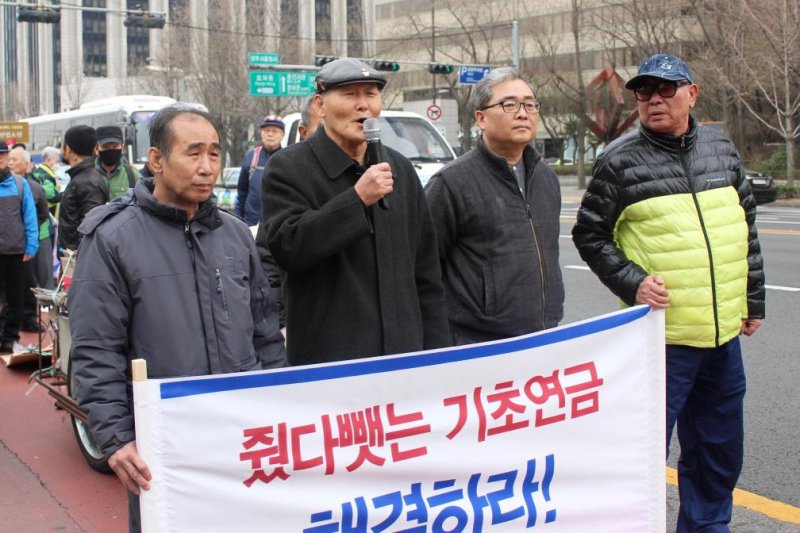1 of 2 | Kim Ho-tae, center left, a basic income recipient in Seoul said Monday the elderly are struggling to make ends meet. Photo by Elizabeth Shim/UPI
SEOUL, March 25 (UPI) -- Kim Yang-ho has witnessed his country rise from the ashes of war and reach a level of development so astounding economists who study South Korea simply call it the "miracle on the Han," a reference to the river that runs through Seoul.
But Kim, 78, who toiled in his youth in various odd jobs as South Korea grew richer, says he feels left behind, even as his country is no longer as poor as it was decades ago.
The elderly South Korean man's sense of loss and alienation is unsurprising. South Korea is a rich country and an Organization for Economic Cooperation and Development member state -- but it also has one of the most anemic social safety nets among developed economies.
Seoul recently said the country's gross national income per capita surpassed $30,000, bringing South Korea closer to Italy in terms of income. But that milestone may not mean much for Kim, who lives at bare subsistence level in northern Seoul.
"I receive $238 in basic monthly income from the government," Kim told UPI. "People like us, the commoners, we don't enjoy any benefits."
Kim said he once worked as a "civil servant" and as a "manual laborer." A middle-school dropout, he is one of 1.5 million South Korean senior citizens who qualify for basic income, a periodic cash payment from Seoul's welfare ministry that's distributed to the bottom 20 percent of South Koreans, age 65 or older.
The welfare subsidy is a pittance by South Korean standards, but owing to a bizarre loophole that affects about 400,000 of those senior citizens, people like Kim have the same basic income "deducted" from another subsidy often referred to as a "living wage."
Kim and about 100 senior citizens and anti-poverty activists marched to the presidential Blue House in Seoul to protest the welfare loophole on Monday.
Kim Ho-tae, who is in his 80s, said the basic income is increasing in April, from $221 to $265. But for recipients of the living wage, which begins at a base level of about $440 per month, the $221 or soon-to-be $265 amount is deducted, owing to the existing loophole. Recipients are effectively excluded from basic income benefits and struggle in poverty, he said.
"We are at a stage where we are being forced to pick up recyclable waste paper just to make ends meet," Kim Ho-tae said as the march to President Moon Jae-in began on Monday. "I plead to you, let us live like others."
Kim Ho-tae, also a resident of Seoul, recently ranked one of the most expensive cities in the world, lives in Dongja-dong, a low-income residential neighborhood.
Lee Myeong-muk, an activist with Sebasa Korea, a group that seeks welfare reform, said Monday the government is cheating the country's poorest elderly over retirement; OECD statistics from 2017 indicate the relative poverty rate of elderly South Koreans is four times the OECD average.
"These are the men and women, in their 70s and 80s, who did not eat properly, did not wear [fine clothes], did not spend their money, who gave up blood, sweat and tears to transform this poor country," Lee said. "I ask, who brought us here today?"
As South Korea struggles with low wages and constrained economic growth, Moon recently called for an "inclusive state" that could strengthen welfare across all demographics, including the country's most needy senior citizens.
Moon said in February he wants to allocate South Korea's wealth to benefit disadvantaged groups, but Kim Yang-ho is skeptical South Korea has improved over time.
"On the outside, we appear rich. It just looks that way," Kim said. "But inside, we're empty and hollow."















